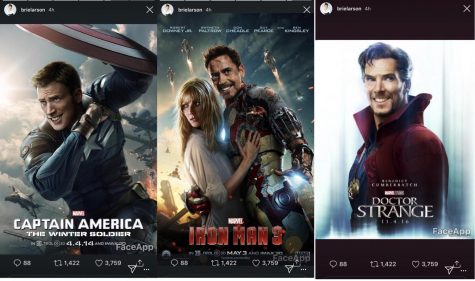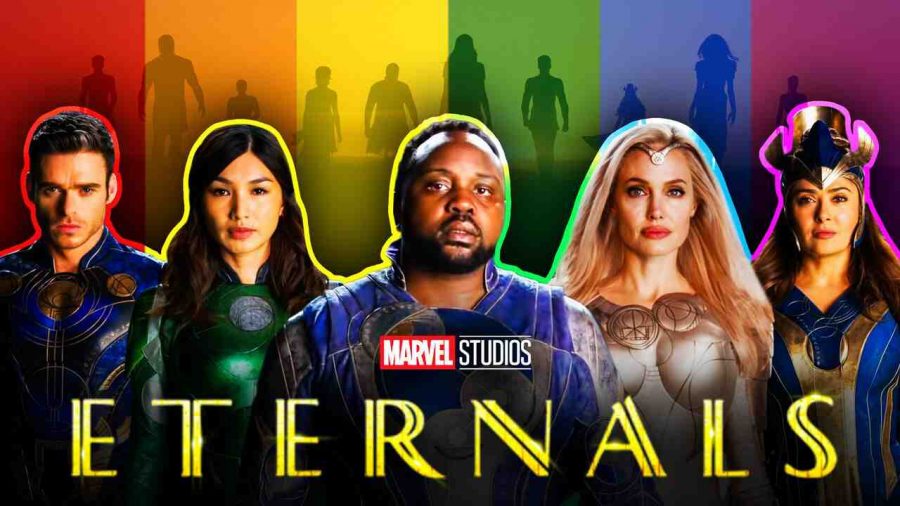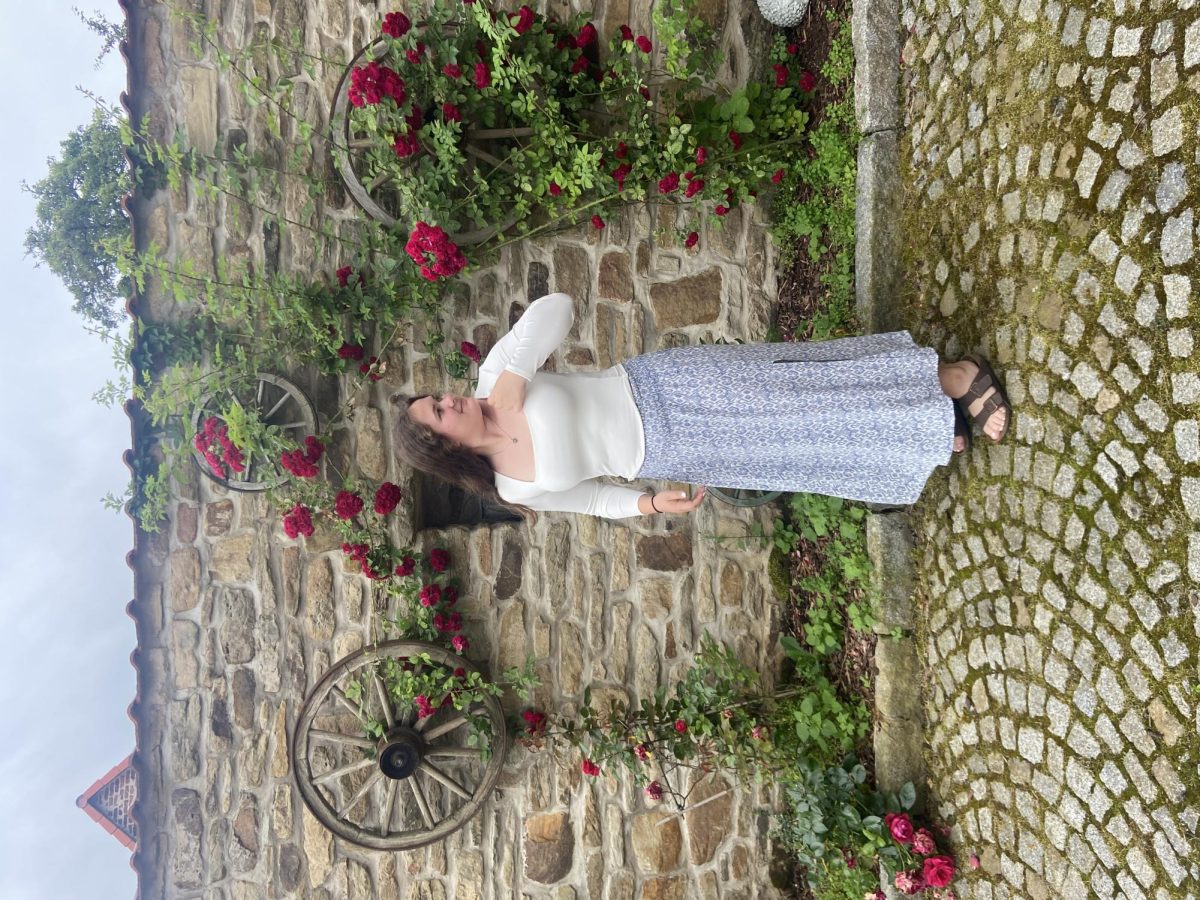Representation in the Marvel Cinematic Universe
November 21, 2021
Representation within the Marvel Cinematic Universe is something that fans have been demanding for years. The closest fans got to openly gay representation was one of the directors of Avengers: Infinity War (2018) making a throwaway line about his partner in the film. The MCU did not have a female titled movie until Antman and the Wasp (2018), a female led movie until Captain Marvel (2019), or a sole female director until Black Widow’s (2021) Cate Shortland. Black Panther (2018) and Shang-Chi and the Legend of the Ten Rings (2021) are the first MCU movies to have a mostly people of color core cast. Chloe Zhao’s Eternals (2021) features the first on-screen gay kiss and first deaf character. The franchise has not been fantastic at representation, as it took them 10 years to start adding any representation to the Marvel Cinematic Universe. They have also been known for erasing the racial identity, gender identity, and sexuality of their characters as well, like in 2015 with the Maximoff twins, in 2016 with the Ancient One, in 2018 with Ayo, and in 2021 with Loki.
Avengers: Age of Ultron (2015) features two Romani and Jewish characters, who are the children of a Holocaust Survivor. Joss Whedon, director of this film, casts two white people, with only one of them actually being Jewish. Elizabeth Olsen, who plays Wanda Maximoff, said in a 2021 interview, “We have a Halloween episode and they were trying to figure out how big of a nod to the character we were going to do and it did start off with the classic Scarlet Witch costume. It was kind of like a g***y that has to wear a headband and I, like, fought for it.” Romani, or Roma, people are an Indo-Aryan ethnic group and they come from regions in India. The g-slur is a negative and racist word that has been used against Romani people for years, and they have expressed their anger at being called this term. Olsen has said the g-slur, on multiple occasions, despite being corrected. In an interview with Graham Norton in 2015, Olsen called Wanda Maximoff the g-slur again. Norton explained to her that the term was a racist term, but she still kept using it when referring to Wanda, as mentioned before.
Having a white person playing a woman of colour is already bad enough, but when they take canonically Jewish characters who are the children of a Holocaust survivor and make them willingly join a Nazi organization is the worst possible thing Joss Whedon could havedone. Wanda and Pietro Maximoff’s comic origins have never been changed from being the twin children of Magneto, a Holocaust survivor. Their origins had never been changed, until Joss Whedon got his hands on the twins, and had them willingly join HYDRA, known Nazi organization within the Marvel Cinematic Universe. It is entirely unprofessional to allow this to happen.
In Doctor Strange (2016), the Ancient One is cast as a white woman. However, his comic origins show him as being a Tibetan man. Kevin Feige, CEO of Marvel Entertainment, stated that the whitewashing of the Ancient One was a mistake, and that he regrets it happened. But Feige told Entertainment Weekly that,“I think if you look at some of the early incarnations of the Ancient One in the comics, they are what we would consider today to be quite, sort of, stereotypical. They don’t hold up to what would work today.” This doesn’t excuse the blatant whitewashing by casting Tilda Swinton as Ancient One. Just because Feige casted Ancient One as a woman to represent one group doesn’t erase the fact that Ancient one was always a Tibetan man.
Black Panther (2018) is a beautiful film. It gave fans so much insight into Wakanda, more backstory, a villain that you could empathize with, and more positive representation to the Marvel Cinematic Universe. This film features the Dora Milaje, a female-only warrior group. Ayo, a member of this group, is a sapphic woman. In World of Wakanda, a comic book series, Ayo is dating Aneka, another member of the Dora Milaje. Since Aneka is not in the film at all, a deleted scene shows Ayo flirting with Okoye instead, who is the General of the Dora. This scene was cut from the final cut of the film, and Ayo’s identity was erased by Marvel Entertainment.
Many people have their problems with Marvel’s Loki (2021). One of the biggest problems is that the show was advertised to have so much representation. Kate Herron, director of Marvel’s Loki, took to Twitter and said, “From the moment I joined ‘Loki’ it was very important to me, and my goal, to acknowledge Loki was bisexual. It is a part of who he is and who I am, too. I know this is a small step but I’m happy, and [my] heart is so full, to say that this is now Canon.” This quote is in reference to Sophia DiMartino’s character Sylvie asking if Loki was interested in princesses or princes. This is the absolute bare minimum of bisexual represenation and the fact that Herron advertised this show as full of representation is utterly laughable.
Russell T Davies, a queer director, said in an interview with Uproxx, “I think that’s a very great worry. ‘Loki’ makes one reference to being bisexual once, and everyone’s like, ‘Oh my god, it’s like a pansexual show.’ It’s like one word. He said the word ‘prince,’ and we’re meant to go, ‘Thank you, Disney! Aren’t you marvelous?’ It’s pathetic. It’s a ridiculous, craven, feeble gesture towards the vital politics and the stories that should be told.” Herron also pat herself on the back for allowing Loki to be genderfluid like they are in the comics, but the only in-show reference was on a piece of paper that labelled Loki’s gender as “fluid”. In the show, Loki ends up falling for a female version of himself, which is 10 steps back for bisexual and genderfluid represenation.
With Marvel’s aversion to representation, it’s hard for LGBTQ, people of color and female fans to see themselves in these characters or even care about them. Chloe Zhao’s Eternals is a gorgeous film that shows how to have representation within the franchise, as well as Black Panther, Captain Marvel and Shang-Chi and the Legend of the Ten Rings. While I could go into detail on how two of these movies are considered “bad” by audiences, the gist of it is that Marvel fanboys hate the idea of someone other than Tony Stark or Steve Rogers being the hero. They would rather have another bland cisgender, heterosexual, white guy be the lead, as opposed to a gay person, a person of color, or a woman.
Homophobes review-blasted Eternals before the movie was even released, very similarly like men did with Captain Marvel. In a since-deleted IMDb review about Eternals, one IMDb user said, “Sucky. Totally unrecognizable from the comics. All it does is tick all the Hollywood Woke boxes. Which seems to be the goal. Not storytelling. But that’s hardly surprising these days. Don’t waste your money. It’s not worth it.” Captain Marvel was review-bombed as well on RottenTomatoes when the movie dropped solely because men didn’t like Brie Larson’s attitude. Clearly, cishet whte men are still vying for Marvel to cater to their needs, while not including gay people, people of colour and women. Let’s not forget, these are the same types of men who blasted Brie Larson for not smiling in the Captain Marvel poster. She responded by photoshopping wide smiles on Captain America, Doctor Strange, and Iron Man’s posters.

Representation is something that’s been fought for by fans for years. Funnily enough, some of the most diverse movies have the best ratings on RottenTomatoes, like Black Panther’s 96% on the TomatoMeter and Shang-Chi and the Legend of the Ten Rings’ 92% on the TomatoMeter. Eternals has an 80% audience score and Black Widow has a 91% audience score on RottenTomatoes as well. Going forward, all fans can do is hope and pray that Kevin Feige and Marvel’s directors add more representation to their films. But until then, we must hold them accountable for the whitewashing and straightwashing of characters, as well as making sure it doesn’t happen again.

